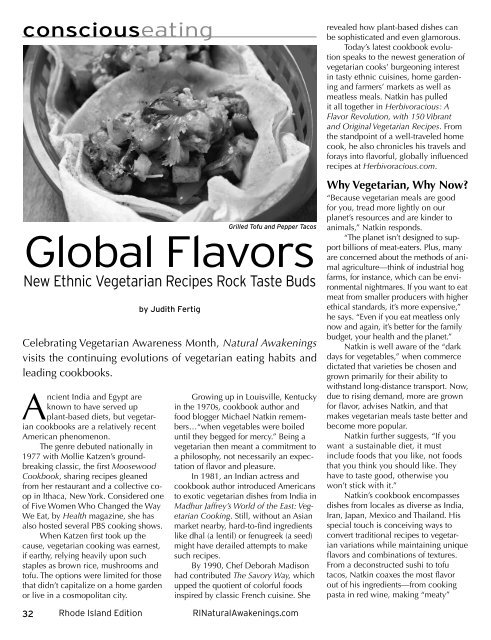Providence, RI - Natural Awakenings
Providence, RI - Natural Awakenings
Providence, RI - Natural Awakenings
Create successful ePaper yourself
Turn your PDF publications into a flip-book with our unique Google optimized e-Paper software.
consciouseating<br />
Global Flavors<br />
New Ethnic vegetarian Recipes Rock Taste Buds<br />
Ancient India and Egypt are<br />
known to have served up<br />
plant-based diets, but vegetarian<br />
cookbooks are a relatively recent<br />
American phenomenon.<br />
The genre debuted nationally in<br />
1977 with Mollie Katzen’s groundbreaking<br />
classic, the first Moosewood<br />
Cookbook, sharing recipes gleaned<br />
from her restaurant and a collective coop<br />
in Ithaca, New York. Considered one<br />
of Five Women Who Changed the Way<br />
We Eat, by Health magazine, she has<br />
also hosted several PBS cooking shows.<br />
When Katzen first took up the<br />
cause, vegetarian cooking was earnest,<br />
if earthy, relying heavily upon such<br />
staples as brown rice, mushrooms and<br />
tofu. The options were limited for those<br />
that didn’t capitalize on a home garden<br />
or live in a cosmopolitan city.<br />
by Judith Fertig<br />
Grilled Tofu and Pepper Tacos<br />
Celebrating Vegetarian Awareness Month, <strong>Natural</strong> <strong>Awakenings</strong><br />
visits the continuing evolutions of vegetarian eating habits and<br />
leading cookbooks.<br />
Growing up in Louisville, Kentucky<br />
in the 1970s, cookbook author and<br />
food blogger Michael Natkin remembers…“when<br />
vegetables were boiled<br />
until they begged for mercy.” Being a<br />
vegetarian then meant a commitment to<br />
a philosophy, not necessarily an expectation<br />
of flavor and pleasure.<br />
In 1981, an Indian actress and<br />
cookbook author introduced Americans<br />
to exotic vegetarian dishes from India in<br />
Madhur Jaffrey’s World of the East: Vegetarian<br />
Cooking. Still, without an Asian<br />
market nearby, hard-to-find ingredients<br />
like dhal (a lentil) or fenugreek (a seed)<br />
might have derailed attempts to make<br />
such recipes.<br />
By 1990, Chef Deborah Madison<br />
had contributed The Savory Way, which<br />
upped the quotient of colorful foods<br />
inspired by classic French cuisine. She<br />
32 Rhode Island Edition <strong>RI</strong><strong>Natural</strong><strong>Awakenings</strong>.com<br />
revealed how plant-based dishes can<br />
be sophisticated and even glamorous.<br />
Today’s latest cookbook evolution<br />
speaks to the newest generation of<br />
vegetarian cooks’ burgeoning interest<br />
in tasty ethnic cuisines, home gardening<br />
and farmers’ markets as well as<br />
meatless meals. Natkin has pulled<br />
it all together in Herbivoracious: A<br />
Flavor Revolution, with 150 Vibrant<br />
and Original Vegetarian Recipes. From<br />
the standpoint of a well-traveled home<br />
cook, he also chronicles his travels and<br />
forays into flavorful, globally influenced<br />
recipes at Herbivoracious.com.<br />
Why Vegetarian, Why Now?<br />
“Because vegetarian meals are good<br />
for you, tread more lightly on our<br />
planet’s resources and are kinder to<br />
animals,” Natkin responds.<br />
“The planet isn’t designed to support<br />
billions of meat-eaters. Plus, many<br />
are concerned about the methods of animal<br />
agriculture—think of industrial hog<br />
farms, for instance, which can be environmental<br />
nightmares. If you want to eat<br />
meat from smaller producers with higher<br />
ethical standards, it’s more expensive,”<br />
he says. “Even if you eat meatless only<br />
now and again, it’s better for the family<br />
budget, your health and the planet.”<br />
Natkin is well aware of the “dark<br />
days for vegetables,” when commerce<br />
dictated that varieties be chosen and<br />
grown primarily for their ability to<br />
withstand long-distance transport. Now,<br />
due to rising demand, more are grown<br />
for flavor, advises Natkin, and that<br />
makes vegetarian meals taste better and<br />
become more popular.<br />
Natkin further suggests, “If you<br />
want a sustainable diet, it must<br />
include foods that you like, not foods<br />
that you think you should like. They<br />
have to taste good, otherwise you<br />
won’t stick with it.”<br />
Natkin’s cookbook encompasses<br />
dishes from locales as diverse as India,<br />
Iran, Japan, Mexico and Thailand. His<br />
special touch is conceiving ways to<br />
convert traditional recipes to vegetarian<br />
variations while maintaining unique<br />
flavors and combinations of textures.<br />
From a deconstructed sushi to tofu<br />
tacos, Natkin coaxes the most flavor<br />
out of his ingredients—from cooking<br />
pasta in red wine, making “meaty”





